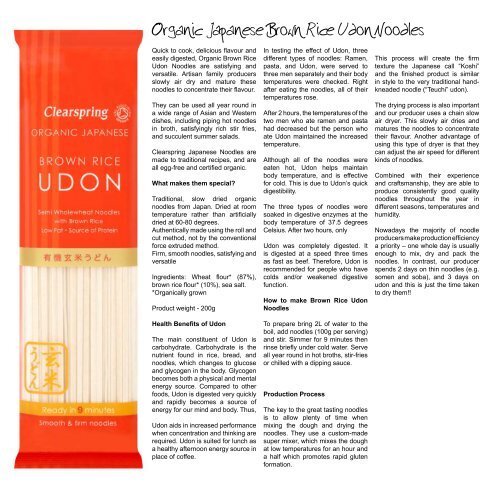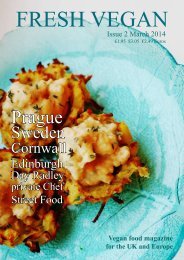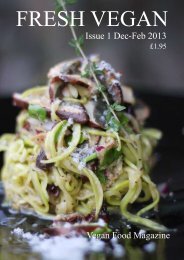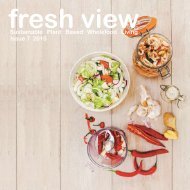FRESH VEGAN Issue 4
Issue 4 Would seem our biggest issue yet! Seeing food from Japan with original Japanese recipes and Chefs from all over our Planet creating their version of Japanese Sushi from Montreal, New York, Japan and London. Interviewing possibly one of my personal favourite companies Clearspring, sharing their unique knowledge on Noodles, our Editor Jacqui interviews them and they share a unique recipe. Mayumi Nishimura traditional Macrobiotic Chef shows us how to make traditional Japanese dumplings as well as sharing recipes from her book and even a competition to own one of her books. Luke Berman shows us what to eat In Kenya and Emily interviews the author Shushana Castle from Rethink Food which Features over 100 doctors, 8 renowned nutritionists, and 8 elite athletes from around the world, covering the benefits of a plant based diet and the diseases associated with eating animal products. Vicki Cosio, Veganuary, Vegan Mashup TV, Day Radley with the best Raw food restaurant to eat in whilst in London are amongst others featured in this issue 4.
Issue 4 Would seem our biggest issue yet! Seeing food from Japan with original Japanese recipes and Chefs from all over our Planet creating their version of Japanese Sushi from Montreal, New York, Japan and London.
Interviewing possibly one of my personal favourite companies Clearspring, sharing their unique knowledge on Noodles, our Editor Jacqui interviews them and they share a unique recipe.
Mayumi Nishimura traditional Macrobiotic Chef shows us how to make traditional Japanese dumplings as well as sharing recipes from her book and even a competition to own one of her books.
Luke Berman shows us what to eat In Kenya and Emily interviews the author Shushana Castle from Rethink Food which Features over 100 doctors, 8 renowned nutritionists, and 8 elite athletes from around the world, covering the benefits of a plant based diet and the diseases associated with eating animal products.
Vicki Cosio, Veganuary, Vegan Mashup TV, Day Radley with the best Raw food restaurant to eat in whilst in London are amongst others featured in this issue 4.
You also want an ePaper? Increase the reach of your titles
YUMPU automatically turns print PDFs into web optimized ePapers that Google loves.
Organic Japanese Brown Rice Udon Noodles<br />
Quick to cook, delicious flavour and<br />
easily digested, Organic Brown Rice<br />
Udon Noodles are satisfying and<br />
versatile. Artisan family producers<br />
slowly air dry and mature these<br />
noodles to concentrate their flavour.<br />
They can be used all year round in<br />
a wide range of Asian and Western<br />
dishes, including piping hot noodles<br />
in broth, satisfyingly rich stir fries,<br />
and succulent summer salads.<br />
Clearspring Japanese Noodles are<br />
made to traditional recipes, and are<br />
all egg-free and certified organic.<br />
What makes them special?<br />
Traditional, slow dried organic<br />
noodles from Japan. Dried at room<br />
temperature rather than artificially<br />
dried at 60-80 degrees.<br />
Authentically made using the roll and<br />
cut method, not by the conventional<br />
force extruded method.<br />
Firm, smooth noodles, satisfying and<br />
versatile<br />
Ingredients: Wheat flour* (87%),<br />
brown rice flour* (10%), sea salt.<br />
*Organically grown<br />
Product weight - 200g<br />
In testing the effect of Udon, three<br />
different types of noodles: Ramen,<br />
pasta, and Udon, were served to<br />
three men separately and their body<br />
temperatures were checked. Right<br />
after eating the noodles, all of their<br />
temperatures rose.<br />
After 2 hours, the temperatures of the<br />
two men who ate ramen and pasta<br />
had decreased but the person who<br />
ate Udon maintained the increased<br />
temperature.<br />
Although all of the noodles were<br />
eaten hot, Udon helps maintain<br />
body temperature, and is effective<br />
for cold. This is due to Udon’s quick<br />
digestibility.<br />
The three types of noodles were<br />
soaked in digestive enzymes at the<br />
body temperature of 37.5 degrees<br />
Celsius. After two hours, only<br />
Udon was completely digested. It<br />
is digested at a speed three times<br />
as fast as beef. Therefore, Udon is<br />
recommended for people who have<br />
colds and/or weakened digestive<br />
function.<br />
How to make Brown Rice Udon<br />
Noodles<br />
This process will create the firm<br />
texture the Japanese call “Koshi”<br />
and the finished product is similar<br />
in style to the very traditional handkneaded<br />
noodle (“Teuchi” udon).<br />
The drying process is also important<br />
and our producer uses a chain slow<br />
air dryer. This slowly air dries and<br />
matures the noodles to concentrate<br />
their flavour. Another advantage of<br />
using this type of dryer is that they<br />
can adjust the air speed for different<br />
kinds of noodles.<br />
Combined with their experience<br />
and craftsmanship, they are able to<br />
produce consistently good quality<br />
noodles throughout the year in<br />
different seasons, temperatures and<br />
humidity.<br />
Nowadays the majority of noodle<br />
producers make production efficiency<br />
a priority – one whole day is usually<br />
enough to mix, dry and pack the<br />
noodles. In contrast, our producer<br />
spends 2 days on thin noodles (e.g.<br />
somen and soba), and 3 days on<br />
udon and this is just the time taken<br />
to dry them!!<br />
50<br />
Health Benefits of Udon<br />
The main constituent of Udon is<br />
carbohydrate. Carbohydrate is the<br />
nutrient found in rice, bread, and<br />
noodles, which changes to glucose<br />
and glycogen in the body. Glycogen<br />
becomes both a physical and mental<br />
energy source. Compared to other<br />
foods, Udon is digested very quickly<br />
and rapidly becomes a source of<br />
energy for our mind and body. Thus,<br />
Udon aids in increased performance<br />
when concentration and thinking are<br />
required. Udon is suited for lunch as<br />
a healthy afternoon energy source in<br />
place of coffee.<br />
To prepare bring 2L of water to the<br />
boil, add noodles (100g per serving)<br />
and stir. Simmer for 9 minutes then<br />
rinse briefly under cold water. Serve<br />
all year round in hot broths, stir-fries<br />
or chilled with a dipping sauce.<br />
Production Process<br />
The key to the great tasting noodles<br />
is to allow plenty of time when<br />
mixing the dough and drying the<br />
noodles. They use a custom-made<br />
super mixer, which mixes the dough<br />
at low temperatures for an hour and<br />
a half which promotes rapid gluten<br />
formation.








